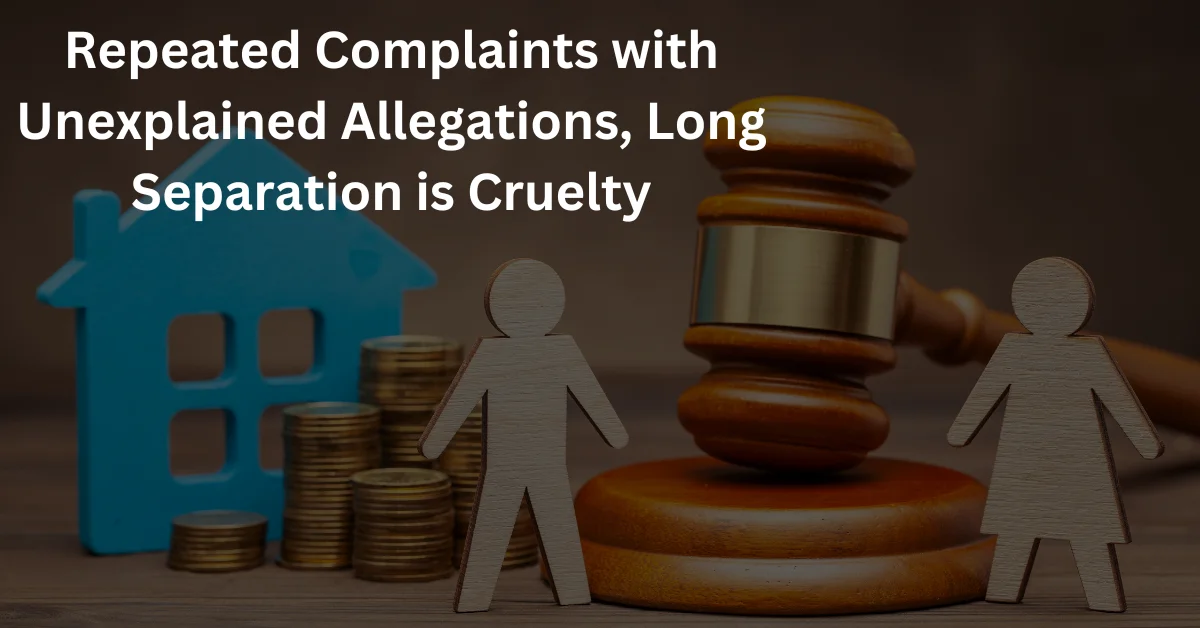Adultery not a ground to deny child custody: Bombay High Court
Even if a woman is not a good wife, it does not necessarily mean that she is not a good mother, the Court added. Adultery cannot be a ground to deny custody of a child to a spouse, even if it is a ground for divorce, observed the Bombay High Court recently. Even if a woman is not a good wife, it does not necessarily mean that she is not a good mother, the Court further noted. Justice Rajesh Patil made these observations while rejecting an application filed by a man seeking custody of his minor daughter on the ground that his wife engaged in adulterous behaviour. The Court held that even if the allegations of adultery may be proved, the custody of the minor child can be granted to the wife. “Adultery is in any case a ground for divorce, however the same can’t be a ground for not granting custody,“ the…
In child custody battle, Supreme Court allows father to meet son at temple, ashram
The Court allowed the man to take his son to the Amritapuri Ashram of Sri Mata Amritanandamayi Devi and the Padanayarkulangara Temple in Kerala’s Kollam. The Supreme Court recently allowed a father in a custody battle to meet his son at an ashram and a temple in Kerala. A bench of Justices AS Bopanna and PS Narasimha had on October 3 allowed the father to meet his child at a mall, while modifying a family court directive that allowed him to meet his son at Court premises. On October 31, the Court modified its October 3 order and allowed the man to take his son to the Amritapuri Ashram of Sri Mata Amritanandamayi Devi and the Padanayarkulangara Temple in Kerala’s Kollam. As allowed earlier, the father can also meet the child at the mall in Kollam. Such an interim arrangement will continue till the family court disposes of the child custody case, the top…
Supreme Court to decide whether transgender woman can claim maintenance under Domestic Violence Act
The Court was hearing an appeal against a Bombay High Court judgment which held that a person who has exercised the right to self-identify as a woman is considered an ‘aggrieved person’ under Section 2(a) of the Act. The Supreme Court of India will decide in January 2025 whether a transgender woman can claim maintenance under the Protection of Women from Domestic Violence Act, 2005 (DV Act). The Court was hearing an appeal moved by a man against a Bombay High Court judgment which held that a person who has exercised the right to self-identify as a woman is considered an ‘aggrieved person’ under Section 2(a) of the Act. A Bench of Justice Vikram Nath and Justice Rajesh Bindal granted leave and listed the matter for January 2025. The top court also sought responses from the concerned parties. The Bombay High Court had in March this year dismissed the man’s petition challenging the applicability of the…
POCSO Act not meant to criminalise consensual romantic relationships between adolescents: Allahabad High Court
“POCSO was formulated to protect children under the age of 18 years from sexual exploitation. Nowadays more often than not it has become a tool for their exploitation, ” the Court added. The Protection of Children from Sexual Offences Act (POCSO Act) was never meant to treat consensual romantic connections between teenagers as criminal offences, the Allahabad High Court recently observed [Mrigraj Gautam v State]. Justice Krishan Pahal further said that though the Act is aimed at safeguarding children from sexual abuse, it is being misused these days to exploit children. “POCSO was formulated to protect children under the age of 18 years from sexual exploitation. Nowadays more often than not it has become a tool for their exploitation. The Act was never meant to criminalise consensual romantic relationships between adolescents,” the Court’s October 26 order stated. The Court added that when bail petitions in POCSO cases come up, courts should examine whether…
“Make prenuptial agreements mandatory”: Delhi court while granting no-fault divorce to couple
The Court stressed that refusal to grant divorce would force parties to suffer further and would amount to “law-induced mental cruelty.” A Delhi court recently said that prenuptial agreements should be made mandatory before entering into marriage so that parties to the marriage need not face law induced mental cruelty. Family Court judge Harish Kumar of the Patiala House Courts made the observation while granting divorce on no-fault basis to a couple who had been involved in legal battles for the last seven years. “Time has come to make compulsory prenuptial agreement to be executed before appointed authority after counseling of the parties about the possible risk of marriage going haywire for variety of reasons and making it mandatory to report breach every time breach occurs under intimation to the party allegedly at fault, making it further clear that if breach not reported he/she would not be heard later on that he/she…
Wife demanding to live separately from husband not always cruelty: Calcutta High Court
“Mere demanding to live separately cannot be said to be a cruelty of such degree which would invite the marital tie to be severed”, the Court said. A mere demand by a wife to live separately from here husband does not always amount to cruelty warranting the severance of marital ties, the Calcutta High Court recently observed. [Koushal Kumar vs Priyanka Kumari]. A division bench of Justices Harish Tandon and Prasenjit Biswas explained that there may be circumstances in which such a demand may be reasonable. In such a situation, both husband and wife have reciprocal obligations to understand the emotions and the circumstances that gave rise to such a demand, the judges added. “Mere demanding to live separately cannot be said to be a cruelty of such degree which would invite the marital tie to be severed. There may be circumstances for such demand which cannot be said to be unreasonable and therefore, it…
Live-in couple entitled to protection even if they are not old enough to marry: Punjab & Haryana High Court
The Court made the observation while ordering police protection to a couple, where the male partner was 18 years old, but not old enough to marry. A couple in a live-in relationship is entitled to protection from threats by their relatives even if the partners in the relationship may not be of marriageable age, the Punjab and Haryana High Court has ruled. [Gurdeep Kaur and another v. State of Punjab] Justice Arun Monga made the observation while ordering police protection to a couple, where the male partner was 18 years old, but not old enough to marry. The judge observed that the right to life and personal liberty under Article 21 of the Constitution was applicable to the couple, regardless of whether they were married or if they were of marriageable age. “The issue in hand, however, is not marriage of the petitioners, but the deprivation of fundamental right of seeking protection…
Parent denied custody of child should be given contact right via video call, not just visitation rights: Tripura High Court
“Unless there are special circumstances to take a different view, the parent who is denied custody of the child should have the right to talk to his/her child for 5-10 minutes every day,” the Court said. A parent who has been denied custody of child should be allowed not just visitation rights but also be granted contact rights to stay in touch with the child, preferably via video call, the Tripura High Court recently said. Children dragged into custody battles between estranged parents cannot be deprived of the love and affection of either parent, single-judge Justice Amarnath Goud opined. Hence, even if a parent is denied custody, such a parent should be given “maximum” visitation rights as well as “contact rights” to stay in touch with the child, the Court said. “In addition to ‘visitation rights’, ‘contact rights’ are also important for development of the child, especially in cases where both parents…
Husband bound to look after wife and children under law and religion: Karnataka High Court
“The husband is bound to look after wife and children. That is a duty which the law & religion to which the parties belong enjoins the husband with,” the Court observed. The Karnataka High Court recently observed that a husband has a duty to take care of his wife and children both in law and religion. Justice Krishna S Dixit made the observation while rejecting a Hindu man’s (petitioner) plea to reduce the maintenance payable by him to his wife and daughter. “The husband is bound to look after wife and children. That is a duty which the law & religion to which the parties belong enjoins the husband with,” the judge observed. The petitioner-husband had challenged a family court’s interim order directing him to pay a monthly maintenance of ₹3,000 to his wife and ₹2,500 to each for his two daughters as an interim measure in the pending case. The husband’s lawyer…
DHC: Repeated Complaints with Unexplained Allegations, Long Separation with almost an Impossible chance of Reconciliation, is Cruelty
The court upheld the divorce pronounced by the Family Court based on the wife’s cruelty against her husband. The case involved an appeal filed by a wife, seeking to set aside a judgment that had dissolved her marriage under Section 13(1)(ia) of the Hindu Marriage Act, 1955. The marriage between the appellant-wife and the respondent-husband was solemnized on November 18, 2010, following Hindu rituals and ceremonies. However, the appellant claimed that she was subjected to cruelty by her husband, leading her to file complaints with the Crime Against Women Cell in 2011. She alleged that on March 5, 2012, she was brutally beaten by her husband and his family members, eventually being thrown out of her matrimonial home while pregnant. The respondent-husband had filed a petition seeking dissolution of the marriage, claiming that there were no children born out of the union. The Family Court framed several issues for consideration,…









